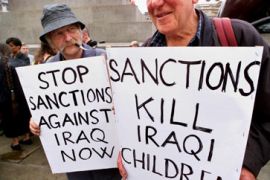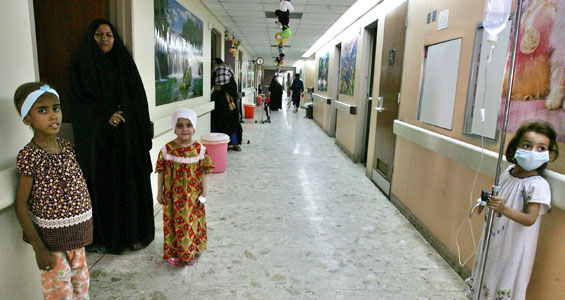Iraq’s legacy of UN sanctions
Baghdad doctors say the health care system never recovered from the embargo years.

 |
| Child cancer rates have increased since sanctions were imposed on Iraq in 1990 [EPA] |
In 1990, UN Security Council resolution 661 imposed economic sanctions and an embargo on Iraq as a punitive measure for its invasion of neighbouring Kuwait.
The sanctions were designed to strip Iraq of its import and export capabilities and persuade it to withdraw from Kuwait to internationally-recognised borders.
Keep reading
list of 4 itemsEurope pledges to boost aid to Sudan on unwelcome war anniversary
Birth, death, escape: Three women’s struggle through Sudan’s war
Does Israel twist humanitarian law to justify Gaza carnage?
Iraq did not withdraw.
In February 1991, US-led military action ousted the Iraqi army from Kuwait but the sanctions were to continue until the government of Saddam Hussein was removed in 2003.
However, by 1996, the UN sanctions were beginning to erode Iraq’s once-thriving middle class and debilitate the country’s health care system.
The UN estimated that up to 1.7 million Iraqis may have died as a result of the sanctions; 500,000 of them were children, by 2003.
Many of them perished as a result of simple medical conditions, such as dehydration, infection, and diarrhoea that could have been easily treated by most over-the-counter medicines found anywhere else in the world.
Iraqi doctors were forced to make do without basic necessities such as antibiotics and rubber gloves. These items and others including crutches, heart medicine, pencils, and water treatment supplies were banned for more than a decade.
The UN sanctions regimen dictated that these items could have been potentially used by Saddam in pursuit of weapons of mass destruction. They labelled them as items of “dual use,” and banned their entry into Iraq for the entirety of the embargo.
Starvation and survival
As early as 1995, the Food and Agricultural Organisation (FAO) warned that Iraqi children faced massive starvation.
Three years later, Dennis Halliday resigned from his post as the UN humanitarian coordinator in Iraq, because he “refused to continue to take Security Council orders … that had imposed and sustained genocidal sanctions on the innocent of Iraq”.
Dr Muna al-Bayati, an Iraqi doctor in Baghdad, 35, remembers studying and practicing medicine at a small, rundown clinic operated by the Iraqi ministry of health during the embargo years.
“There was virtually no anaesthetic for the entire time let alone, any of the basic medical and dental material that any doctor in the world would require,” she said.
She recalls turning away patients from necessary treatment because of the lack of supplies.
Inadequate health care
Nearly five years after sanctions were lifted, however, she says she is frustrated that the current health care system is still inadequate.
She says lack of safety and instability make her work at a public hospital during the day, and at her private practice in the evening, “dangerous and underpaid”.
She said: “The sanctions were dark days, but these days are even darker.”
Al-Bayati remains thankful for the fact that she was able to at least survive the sanctions, unlike many of her own neighbours and family members.
Just a few houses down from where she grew up in the Al-Kadhmiya district, Um Muhannad bore a much heavier cost of UN policies, losing her youngest child to leukaemia in 2000.
“In our neighbourhood, UN sanctions stripping Iraqi doctors of the basics meant the senseless death of our children,” al-Bayati said.
Children affected
 |
| Iraq’s health care system is still reeling from the effects of the sanctions [EPA] |
By 2001, Iraqi doctors began to report staggering increases in child cancer rates, as high as three or four times in cities like Basra, and urged the international community to lift the sanctions.
Zaid Abdul Hadi, an Iraqi scientist, says the impact of the sanctions on the country are irreversible.
He currently works with the International Centre for Agricultural Research in Dry Areas (ICARDA) on projects to empower impoverished communities with the technology and skills to improve food production.
The organisation, which currently has ongoing projects in Iraq, works closely with related sectors in the UN.
“The sanctions contributed to the destruction of the fabric of Iraqi society, reaffirming the fact that people must never be punished based on the behaviour of a single dictator,” Abdul Hadi told Al Jazeera.
“The middle class virtually collapsed and as a result, many professionals left the country as they could not survive with very meagre incomes. It drove so many children to the street and the job market as families no longer afforded to keep their children in school, so large sections of the young became illiterate,” he said.
Corruption, mismanagement
In 1996, as its own agencies began to warn of an impending humanitarian disaster, the UN Security Council passed resolution 986, which instituted the oil-for-food programme to allow Iraq to sell oil and procure funds to buy food and medicines.
However, a UN sanctions committee monitored how the money was spent and directed which food and medicines contracts were permissible.
Iraqi doctors said the programme fell far short of meeting even the basic nutritional needs of many people.
By the time the programme was discontinued in 2003, allegations of corruption and bribery implicating UN employees surfaced.
“The corruption of the sanctions regime became so endemic that it is only natural now to see now even more corruption as it became natural for government employees to steal and receive bribes. Greediness became the order of the day and it will be very difficult to shake it off for many years to come even if close monitoring is put in place,” Abdul Hadi said.
“The reputation of the UN suffered greatly under the sanctions.”
A blind eye?
Many Iraqis living abroad felt the UN was undermining its own charter in Iraq and that the international community had turned a blind eye to the suffering of the Iraqi people.
Dr Dahlia Wasfi, originally from Basra but now living in the US, has been an outspoken critic of American intervention in her homeland, most notably after the 2003 invasion.
She has visited Iraq several times to examine living and medical conditions in the country.
“Economic sanctions starved the Iraqi people. Many teenagers and children who were born during the years of sanctions suffer from malnutrition, having literally physically experienced starvation,” she told Al Jazeera.
By 1997, Unicef found that nearly 1,000,000 children in central and southern Iraq were chronically malnourished.
She adds: “The only reason I have family alive in Iraq today to go visit is because my father was here in the US, working full-time, year-round, and sending money to buy food. It was a degree of suffering for them that I cannot even imagine.”
Iraqi officials surprised
A former senior Iraqi diplomat tells Al Jazeera that no one in Saddam’s government believed the sanctions and embargo would be so harsh.
“When the Security Council passed resolution 661 on that day, none of us thought that our entire population would be denied food, medicine, and other basic necessities for more than ten years,” the former Iraqi ambassador said on the condition of anonymity.
He admits that Saddam was mistaken in occupying neighbouring Kuwait and invoking the punishment of the Security Council.
However, he said that, “countries around the world, and the UN, refused to break the siege and must share the blame for the death of more than a million innocent Iraqis”.
He remembers the sanctions mostly for being, “dehumanising in the way each Iraqi’s value was rationed and handed out to them in grams of rice or sugar”.
As the UN celebrates the 60th anniversary of the Universal Declaration of Human Rights, Iraqis have a different impression of the international organisation’s human rights record that claims to be built on the “recognition of the inherent dignity and of the equal and inalienable rights of all members of the human family [as] the foundation of freedom, justice and peace in the world.”.
From Baghdad, al-Bayati says she will remember the UN for the “senseless deaths, foul-smelling hospitals, and long line-ups for eggs and fuel”.